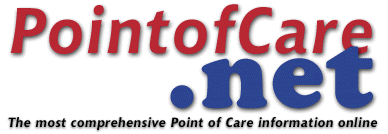Publications
Quality Point of Care
Testing: A Joint Commission Handbook. JCAHO. 1999. ISBN: 0-86688-604-4. Click here to
read more about this publication.
Point-of-Care Testing.
Christopher P. Price and Jocelyn M. Hicks. AACC. 1999. ISBN: 1-890883-23-9.
Click here for ordering information from
AACC.
At last – the first text to bring
together 1) the analytical principles of point-of-care testing (POCT) technology, 2)
management issues, and 3) case studies of actual or potential application. Written by an
international list of contributors, this book gives you the latest developments in this
rapidly growing field. The first section explores the analytical principles underlying
POCT systems, and the ways in which the devices been designed to reflect the environment
in which they are used. The second section covers POCT management issues, including
procurement of equipment, training and certification of staff, supervision of testing,
quality control, quality assurance, information management, and the economics of
POCT. The
third section offers a range of scenarios for point-of-care testing, and explores the
evidence to support or refute the benefits of point-of-care testing. The case studies
presented conform to the guidelines on evidence-based laboratory medicine. If you are
dealing with point-of-care testing, you need this book! |
Strategic Assessment of the
U.S. Point-of-Care Testing Markets. Frost & Sullivan.
January 1998. 111 pp.
| The total
U.S. point-of-care testing (POCT) market generated revenues of $1.6 billion in 1996. Past
successes and projections of even greater success in the future have sparked significant
interest in this market. Proponents of point-of-care tests claim that the market could
expand significantly, perhaps encompassing virtually all of the diagnostics market. This report assesses the current condition of
POCT in various segments of the diagnostic market and highlights which segments are likely
to be lucrative for a point-of-care approach. Discussions of technologies employed, trends
favoring or restraining POCT, expert opinions, and strategies for implementing POCT are
included to guide your company to maximum market success. |
Hitchhiker's Guide to Point of Care Testing.
Bourlier,
Karen. AACC. 1998. ISBN: 1-890883-06-9. Click
here for ordering information from AACC.
A brand new quick-reference guide to point-of-care laboratory testing.
Point-of-care technology can deliver quick, simple, portable, user-friendly, and reliable
test results. Instead of a fad, it's now an essential component of health care testing.
This book covers the basics to help you become familiar with point-of-care testing.
Similar to The Hitchhiker's Guide to Clinical Chemistry and DNA Simplified II:
The Illustrated Hitchhiker's Guide to DNA, this book presents an alphabetical listing
of terminology and topics related to point-of-care testing. Each item is described in
plain English, providing a simplified guide for laboratorians and non-laboratorians who
are working in, or preparing for, point-of-care testing. From Accreditation to Whole Blood
Analyzers, you'll find a brief explanation of most major point-of-care buzzwords. Order
your copy today to get a better handle on point-of-care testing and technology! |
Multiskilling: Point of Care Testing-Capillary Puncture
for the Health Care Provider. Beverly M. Kovanda, PhD, MS, MT (ASCP), CLP (NCA).
Delmar Publishers. 1998. ISBN: 0-8273-8453-X
Multiskilling:
Point-of-Care Testing for Health Care Providers teaches the student how to perform
point-of-care testing so that diagnostic decisions can be made within minutes.
Point-of-care testing occurs from a capillary puncture, a high-risk procedure. This text
not only shows how to perform this procedure, but also emphasizes safety, minimizing
discomfort to the client and accurately collecting a capillary blood specimen which will
yield quality point-of-care test results, thus providing a higher level of patient care. |
Handbook of Bedside Glucose Testing.
Glen Hortin. AACC. 1998. ISBN: 1-890883-05-0. Click
here for ordering information from AACC.
A comprehensive, easy-to-read overview of information needed by trainers and
coordinators for bedside glucose testing - such as medical technologists, nurses, or
diabetes educators - and personnel who frequently perform bedside glucose testing. Among
the topics covered are the benefits, shortcomings, and alternatives to bedside glucose
testing; diabetes monitoring and management; sample collection; meter technologies and
test principles; sources of error in measurement; quality assurance and quality control;
selection and evaluation of meters; management of testing; economic issues; personnel
training; data management; and laboratory regulations and certification. Use this handbook
to help your staff and your lab provide the highest quality, most efficient patient care
possible! |
Point-of-Care Testing, A Self-Study Course
Frederick L. Kiechle
Learn the basics of developing and implementing a POCT program
|

